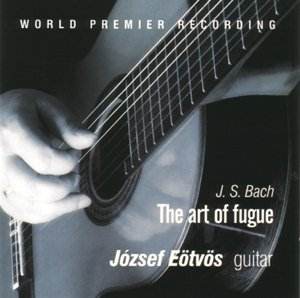József Eötvös, whose Goldberg
Variations on guitar were, in spite of a few issues of tempo,
a brilliant approach to one of Bach's finest works, brings listeners
not only a unique recording but a world premiere with this two-disc
set of the Art of Fugue for guitar. Those familiar with the Art
of Fugue, and with the guitar and its range, will wonder how Eötvös
managed to record this work on such a limited instrument. He made
an interesting choice, that of using two eight-string guitars,
tuned a fourth apart, and overdubbing them. The result is astounding.
The Art of Fugue is one of the most profound
works of music ever written, and listening to the subtle counterpoint
of its canons and fugues one is astounded at how Bach took a simple
theme and wove around it so many different pieces. Usually played
on keyboard - though many arrangements have been made for other
instruments - the guitar turns out to be an ideal instrument for
this work. The attack and decay of its strings lend an unexpected
sound to the music.
Eötvös performs this work with no adaptation
or arrangement at all; he plays the score as it stands. The only
areas where this doesn't work well are at the high end of his
instruments, where the notes sound a bit weak and the decay is
very short, but this is par for the course with plucked instruments
such as guitars or lutes. Aside from this, Eötvös's
recording is exemplary, and his performance luminous. Having four
hands to play these fugues lets him dissect them and perform them
with much different accents than using only two hands on a keyboard.
Eötvös deploys the full range of effects
with his instrument, such as a brilliant staccato interpretation
of the Canon alla Ottava, played in the fifth position in his
performance. His rhythmic drive is energetic when needed and restrained
when most effective as such. The range he is able to cover with
his guitars is also impressive, allowing the instruments to play
deep bass notes and fleeting treble notes at the same time.
The final, unfinished fugue is played here with
almost a sombre tone, at a perfect tempo, but giving more weight
to the lower notes, which highlights the density of this great
fugue.
One item of interest for guitarists - the second
CD in this set is a CD Extra containing scores of some of the
fugues and partial recordings so you can play along with Eötvös,
like a Music Minus One record.
This recording is truly a revelation - you have
never heard the Art of Fugue like this, never heard such a distinctive
approach that brings out the texture of Bach's masterful counterpoint.
József Eötvös is an excellent performer, and
this recording is brilliant.
Kirk McElhearn

